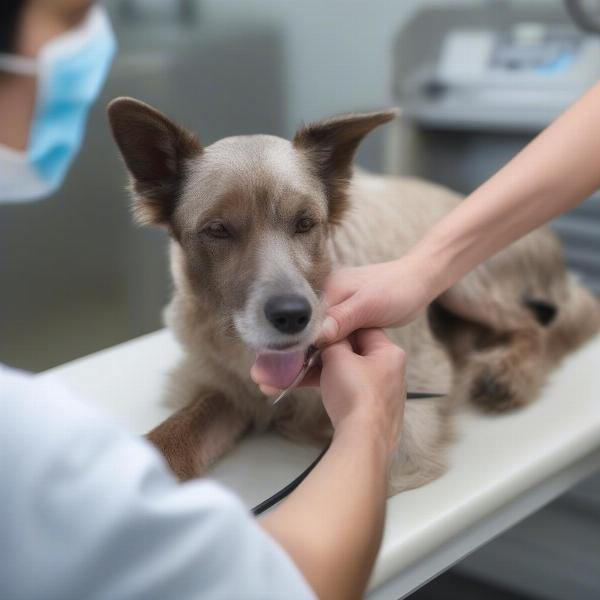Dogs spending time outdoors can develop allergies, and grass is a common culprit. If your dog is constantly itching, licking their paws, or experiencing skin irritation after being in the grass, they might be allergic. This article will guide you through understanding, managing, and preventing grass allergies in dogs.
Understanding Grass Allergies in Dogs
Grass allergies in dogs are a type of environmental allergy, also known as atopy. It’s a reaction to pollen and other proteins found in grass. Unlike humans who typically experience respiratory symptoms with pollen allergies, dogs usually show skin-related signs. These can include itching, redness, hives, excessive licking, and chewing of paws and skin. Some dogs might also develop ear infections or eye irritation.
Identifying Grass Allergies in Dogs: What to Look For
Recognizing grass allergies can be tricky since symptoms can mimic other skin conditions. Look for patterns: Does your dog’s itching worsen after spending time outdoors, particularly on grassy areas? Are their paws particularly irritated? Keeping a log of your dog’s symptoms and when they occur can help your veterinarian make an accurate diagnosis.
Diagnosing Grass Allergies: Veterinary Expertise
While you can observe your dog’s behavior and symptoms, a definitive diagnosis needs to come from a veterinarian. They might perform skin tests or blood tests to identify specific allergens. allergic reaction to grass in dogs can be confirmed through these tests, differentiating them from other potential causes of skin irritation.
 Veterinarian examining dog's skin for allergies
Veterinarian examining dog's skin for allergies
Managing Grass Allergies: Treatment Options
Several treatments can help alleviate your dog’s discomfort from grass allergies. Your veterinarian might prescribe antihistamines, corticosteroids, or other medications to control itching and inflammation. anti itch cream for dogs can provide localized relief. Immunotherapy, a series of injections that gradually desensitize your dog to the allergen, is another option for long-term management.
Preventing Grass Allergies: Minimizing Exposure
While completely eliminating grass exposure is difficult, you can take steps to minimize it. Wipe your dog’s paws and coat with a damp towel after they’ve been outside. Regular bathing can help remove allergens from their fur. Consider creating a designated “grass-free” area in your yard using alternative ground cover like mulch or paving stones. grass allergies dogs can be managed effectively by reducing contact with the allergen.
Can dogs be allergic to certain types of grass?
Yes, dogs can be allergic to specific grass species. Some common culprits include Bermuda grass, Kentucky bluegrass, and Timothy grass.
What are the signs of a severe grass allergy in dogs?
Severe reactions can include intense itching, skin lesions, hair loss, secondary infections, and difficulty breathing in rare cases. Seek immediate veterinary attention if your dog exhibits any of these signs.
Conclusion
Dealing with grass allergies in your dog can be challenging, but with proper management and preventative measures, you can significantly improve their quality of life. By working closely with your veterinarian and understanding the triggers and treatment options, you can help your furry friend enjoy a comfortable and itch-free life. Remember, identifying and managing [dogs allergic to grass] is crucial for their well-being.
FAQ
- How can I tell if my dog is allergic to grass? Observe for increased itching, licking, and skin irritation after being in grassy areas. Consult your veterinarian for a proper diagnosis.
- What can I do to help my dog with grass allergies? Minimize grass exposure, wipe their paws and coat after walks, and consult your veterinarian for treatment options like medications or immunotherapy.
- Are there any home remedies for dog grass allergies? While some home remedies might offer temporary relief, always consult your veterinarian before trying any new treatments.
- Can grass allergies be cured in dogs? While complete cures are rare, allergies can be effectively managed with appropriate treatment and preventative measures.
- Is it necessary to see a vet for grass allergies? Yes, a veterinarian can accurately diagnose the allergy and recommend the most suitable treatment plan for your dog.
- Can other environmental factors contribute to grass allergy symptoms? Yes, factors like pollen, dust mites, and mold can exacerbate allergy symptoms.
- Are certain breeds more prone to grass allergies? Some breeds, like Terriers, Retrievers, and Bulldogs, are considered more susceptible to allergies, including grass allergies.
Related articles: tick and flea prevention for dogs canada, hot dog pain.
About ILM Dog: ILM Dog is your trusted international resource for all things dog-related. From breed selection and healthcare advice to training tips and product recommendations, we provide expert guidance for both new and experienced dog owners. Our focus on health, behavior, nutrition, and overall well-being helps you provide the best possible care for your canine companion. For expert advice or personalized consultations, contact us at [email protected] or +44 20-3965-8624.